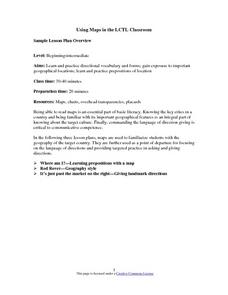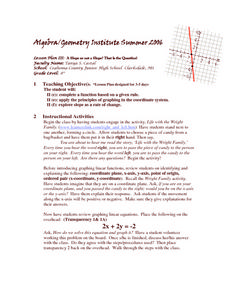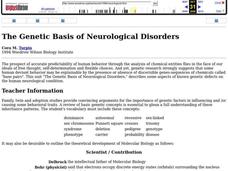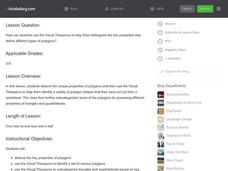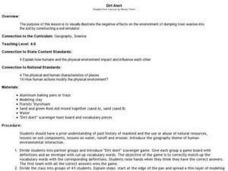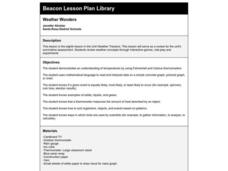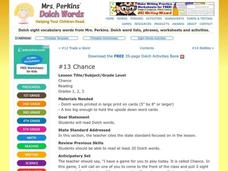Curated OER
Measuring Elapsed Time
Fifth graders convert units within the same measurement system and be able to determine elapsed time. They are given a start time and an end time of a game. Students determine the amount of elapsed time from the data that is given.
Curated OER
Using Maps in the LCTL Classroom
Students review terms and prepositions of location and view a map to illustrate the meanings of the prepositions students are unfamiliar with. They play "Where am I?" game utilizing correct prepositions then they work with a partner to...
Curated OER
Collocation Pelmanism
Students read and analyze the article, "Lexical exploitation of texts," and become aware of the concept of recycling new words. They practice this concept several times in class before they take on the memory game pelmanism in the follow...
Curated OER
Coupon Clippers: Understanding Comparative Shopping
Third graders participate in a shopping spree after listening to Pigs Go to Market: Fun with Math and Shopping. After the story is read aloud, 3rd graders answer discussion questions and review key vocabulary. Students complete provided...
Curated OER
Valentine’s Day Unit: Writing & Literacy Center Activities
Students participate in Valentine's Day writing and literacy center activities. In this writing and literacy lesson, students develop Valentine's Day journals using recycled cards and small blank sheets of paper. They write sentences...
Curated OER
Using Pictures in the Classroom
Students review vocabulary by answering questions about an image, drawing the picture and taking notes. They compare their pictures and describe the differences.
Curated OER
A slope or not a slope? That is the question.
Eighth graders investigate concepts related to Cartesian Coordinates. They use a creative game at the beginning of the lesson to identify quadrants by passing candy to one another. The rest of the lesson is using vocabulary and problem...
Curated OER
The Genetic Basis of Neurological Disorders
Students explore neurological disorders. They examine the presence and absence of discernible genes. Students describe neruological diseases and draw faces of affected persons. They play a human neurology disorders learning game.
Curated OER
Objects Around the Classroom
Students explore vocabulary related to classroom objects and prepositions of place. They label objects in the classroom with self-adhesive labels. They review prepositions of place and create a song involving classroom objects.
Alabama Learning Exchange
Lining up the Decimals
Fifth graders order decimals from least to greatest and greatest to least. For this decimal order instructional activity, 5th graders complete an online review of comparing 2 digit numbers. Students then complete a decimal order card...
Achieve3000
Discriminating Phonemes
Develop the fluency of beginning readers one sound at a time with this phonemic awareness lesson. Through a series of whole-class instruction, independent practice, and collaborative learning activities, children practice...
Curated OER
Social Studies: Food and Dining in Cameroon
Students review their findings on Cameroon and play a vocabulary game. Using provided recipe packets, they present a mock cooking show with a student narrating in French. They role-play as exchange students and write letters home about...
Curated OER
GIPSE Lesson Plan
Students participate in a Chemardy game that shows what they recall from the previous year of Chemistry. They use the computer lab and various web sites to explore other areas of chemistry. Students discuss if they think that they...
Curated OER
Using Map Skills
Third graders study maps. In this U.S. geography lesson, 3rd graders explore directions on a compass rose and use a map scale to determine distances between two points on a map. They listen to a lecture and use their own maps to practice...
Curated OER
Accounting -- Forming and Solving Business Organizations
High schoolers review what a proprietorship is and the advantages and disadvantages of it. In groups, they examine the ways to form and dissolve a proprietorship. To end the lesson, they review what a corporation is, its advantages and...
Curated OER
Know Your Polygons!
Learners identify and categorize different polygons. In this polygons lesson plan, students research and identify properties of polygons, identify different polygon shapes, and categorize different triangles and quadrilaterals.
Curated OER
Musher Madness
Young scholars discover facts about Iditarod racing. For this language arts lesson, students create a class musher picture dictionary selecting terms from the Musher Term list. Additionally, young scholars create a class picture...
Curated OER
Biochemistry Taboo
Students play a "Biochemistry Taboo" game using their knowledge of Biological chemistry and taboo cards. This lesson can be used as a review or an introduction into concepts covered in Biochemistry and includes a pre-activity worksheet.
Curated OER
Dirt Alert
Students explore the environment and effects of pollution. They participate in a "Dirt Alert" scavenger game to study vocabulary words. Students construct a soil simulator to visually illustrate the negative effects on the environment of...
Curated OER
The Atrazine Dilemma
Students understand how farming practices and the topography of a region can effect the health and safety of all living things. Students play a game which helps them understand how the chemical Azatrine has spread in the watershed.
Curated OER
The Universe in a Different Light
Students become aware of some of the objects studied in, and concepts associated with, high-energy astronomy. They do this by participating in card games that teach and review these concepts.
Curated OER
Chance
Students practice sight words using the Dolch vocabulary lists. In this sight word lesson, students are engaged in a whole class game that allows every student to practice reading Dolch words off index cards. Students then...
Curated OER
Dependents and Tax Credits
Students identify "count" and "non-count" nouns, and examine and discuss the Earned Income Tax Credit. They define key vocabulary words, complete various worksheets, read a newspaper article, and answer discussion questions.



